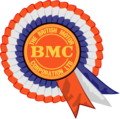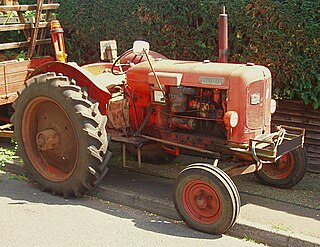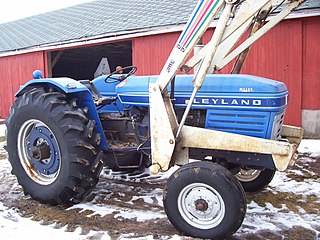
MG is a former British automotive marque founded by Cecil Kimber in the 1920s, and M.G. Car Company Limited was the British sports car manufacturer that made the marque famous. Best known for its open two-seater sports cars, MG also produced saloons and coupés, with engines up to three litres in size and 3.5 L in the case of the MGB GT V8. The marque is now owned by Chinese state-owned automaker SAIC Motor.

Morris Motors Limited was a British privately owned motor vehicle manufacturing company formed in 1919 to take over the assets of William Morris's WRM Motors Limited and continue production of the same vehicles. By 1926 its production represented 42 per cent of British car manufacture—a remarkable expansion rate attributed to William Morris's practice of buying in major as well as minor components and assembling them in his own factory. Largely self-financed through his enormous profits, Morris did borrow some money from the public in 1926, and later shared some of Morris Motors' ownership with the public in 1936. The new capital was then used by Morris Motors to buy many of his other privately held businesses.

The British Motor Corporation Limited (BMC) was a UK-based vehicle manufacturer, formed in early 1952 to give effect to an agreed merger of the Morris and Austin businesses.

The Austin Motor Company Limited was an English manufacturer of motor vehicles, founded in 1905 by Herbert Austin in Longbridge. In 1952 it was merged with Morris Motors Limited in the new holding company British Motor Corporation (BMC) Limited, keeping its separate identity. The marque Austin was used until 1987 by BMC's successors British Leyland and Rover Group. The trademark is currently owned by the Chinese firm SAIC Motor, after being transferred from bankrupt subsidiary Nanjing Automotive which had acquired it with MG Rover Group in July 2005.

British Leyland was an automotive engineering and manufacturing conglomerate formed in the United Kingdom in 1968 as British Leyland Motor Corporation Ltd (BLMC), following the merger of Leyland Motors and British Motor Holdings. It was partly nationalised in 1975, when the UK government created a holding company called British Leyland, later renamed BL in 1978. It incorporated much of the British-owned motor vehicle industry, which in 1968 had a 40% share of the UK car market, with its history going back to 1895. Despite containing profitable marques such as Jaguar, Rover, and Land Rover, as well as the best-selling Mini, BLMC had a troubled history, leading to its eventual collapse in 1975 and subsequent part-nationalisation.

William Richard Morris, Viscount Nuffield,, was an English motor manufacturer and philanthropist. He was the founder of Morris Motors Limited and is remembered as the founder of the Nuffield Foundation, the Nuffield Trust and Nuffield College, Oxford, as well as being involved in his role as President of BUPA in creating what is now Nuffield Health. He took his title from the village of Nuffield in Oxfordshire, where he lived.

Riley was a British motorcar and bicycle manufacturer from 1890. Riley became part of the Nuffield Organization in 1938 and was merged into the British Leyland Motor Corporation in 1968. In July 1969 British Leyland announced the immediate end of Riley production, although 1969 was a difficult year for the UK automotive industry and many cars from Riley's inventory may have been first registered in 1970.

Hindustan Motors is an Indian automotive manufacturer based in Kolkata. It is a part of the Birla Technical Services conglomerate. Hindustan Motors was the largest car manufacturer in India before the rise of Maruti Udyog. Hindustan Motors manufactured the Ambassador and Landmaster motorcars, both immensely popular Indian automobiles from 1957 to 2014.

Nuffield Organization was the unincorporated umbrella-name or promotional name used for the charitable and commercial interests of owner and donor, William Morris, 1st Viscount Nuffield. The name was assumed following Nuffield's gift made to form his Nuffield Foundation in 1943, it linked his business interests to his existing very generous philanthropy. The same enterprises had previously been referred to as the Morris Organizations and at first described itself as The Nuffield Organization, A Cornerstone of Britain's Industrial Structure.

Wolseley Motors Limited was a British motor vehicle manufacturer founded in early 1901 by the Vickers Armaments in conjunction with Herbert Austin. It initially made a full range, topped by large luxury cars, and dominated the market in the Edwardian era. The Vickers brothers died and, without their guidance, Wolseley expanded rapidly after the war, manufacturing 12,000 cars in 1921, and remained the biggest motor manufacturer in Britain.

The Nuffield Universal was a tractor produced from 1948 by the Agricultural Division of Morris Motors, later a subsidiary of The British Motor Corporation Limited. When William Morris the founder of Morris Motors was honoured with a title and elevated to the peerage he chose the name of his Nuffield, Oxfordshire village. When in 1948 the Morris Motors Agricultural Division launched its tractor range, the name Nuffield was chosen to be the brand name for the company's agricultural products. The design was similar to the new David Brown built tractors as the designer Dr. Merit had also worked on the design of the David Brown 50D before moving to Nuffield. Nuffield were part of the amalgamations that created British Leyland in 1968, becoming part of Leyland Tractors.

Pressed Steel Company Limited was a British car body manufacturing business founded at Cowley near Oxford in 1926 as a joint venture between William Morris, Budd Corporation of Philadelphia USA, which held the controlling interest, and a British / American bank J. Henry Schroder & Co. At that time the company was named The Pressed Steel Company of Great Britain Limited. It acquired Budd's patent rights and processes for use in the United Kingdom. Morris transferred his interest to his company, Morris Motors Limited.

Morris Commercial Cars Limited is a British manufacturer of commercial vehicles formed by William Morris, founder of Morris Motors Limited, to continue the business of E G Wrigley and Company which he purchased as of 1 January 1924.

The Oxford Bus Museum is a transport museum at Long Hanborough, West Oxfordshire, England, about 4 miles (6.4 km) northeast of Witney and 7 miles (11 km) northwest of the city of Oxford. The museum houses a collection of 40 historic buses and coaches, the remains of four horse trams and a replica City of Oxford Tramways Company tram.
British Motor Corporation (Australia) was a motor manufacturing company formed in Australia in 1954 by the merger of the Austin Motor Company (Australia) and Nuffield (Australia). This followed the merger in 1952 of the Austin Motor Company and the Nuffield Group in the United Kingdom to form the British Motor Corporation. Following further corporate changes in the UK in the late 1960s, BMC Australia was absorbed into the newly established British Leyland Motor Corporation of Australia, the name of which became Leyland Motor Corporation of Australia in 1972, and then JRA Limited in March 1983.

Nuffield Press was a publisher and printer formed by William Morris as part of his Nuffield Organization in 1925. It was formed to primarily produce promotional literature for the motor vehicle manufacturing divisions of the organization, and later expanded to printing of all types including owner's manuals, technical manuals, magazines, diaries, and posters.

Nuffield Mechanizations and Aero Limited, also known as Mechanizations and Aero Ltd and Nuffield Mechanizations Ltd was Lord Nuffield's personal enterprise developing improved methods for mechanisation and mobility of the British Army and the ground section of the Royal Air Force.

Leyland tractors was a tractor manufacturer in the United Kingdom. It was created after the merger of the British Motor Corporation (BMC) with Leyland Motors to form British Leyland in 1968. Nuffield Tractors had been started after World War II by Lord Nuffield owner of Morris Motors Limited which had become part of BMC in 1951.
Morris Engines Limited was located in Coventry, England. It specialised in the mass production of engines and gearboxes for vehicles made by W. R. Morris's businesses, later known as the Nuffield Organization. Morris Engines Ltd. was, therefore, partly responsible for Morris Motors Ltd. becoming Britain's leading motor manufacturer.

British shadow factories were the outcome of the Shadow Scheme, a plan devised in 1935 and developed by the British government in the buildup to World War II to try to meet the urgent need for more aircraft using technology transfer from the motor industry to implement additional manufacturing capacity.



















